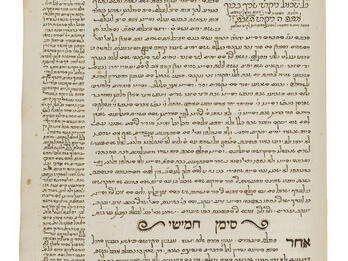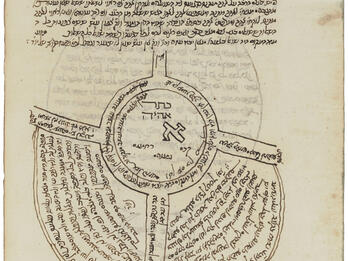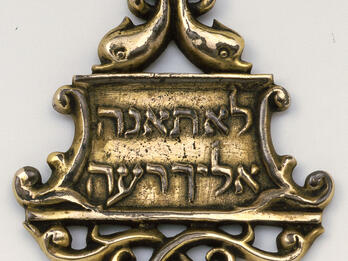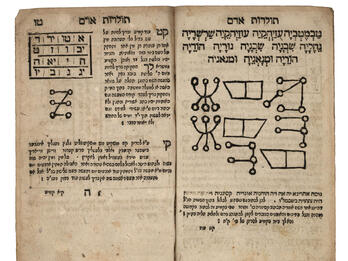Sefer ha-gilgulim (The Book of Reincarnations)
Chapter 71
And now we will explain the root of Moses our Rabbi, may peace be upon him. Know that Israel was distilled in Egypt, as it was an iron furnace (Deuteronomy 4:20). And it is known that Moses is Abel, and good and evil were mixed [in him (i.e., Abel)]. Moses was the root of all the souls of Israel from the good part: and when she saw him that he was good (Exodus 2:2). And the mixed multitudes [see Exodus 12:38] were from the evil part. And there is also in Cain good and evil; the good was separated out, while regarding the evil, those people died in the three days of darkness (Exodus 10:22). And Elijah is the root of all of the souls of Israel from the side of good judgment. And from the side of mercy [ḥesed] is Moses. And this is the meaning of the verse: Let me not see my own evil (Numbers 11:15) [which Moses said] when the Holy One wanted to kill the mixed multitude. And Elijah ascended to the heavens in a tempest, through the secret of the female waters.1 The mixed multitude left at the wrong time, and they were still in a state of disrepair. And because they left at the wrong time, they sinned. And the death of our lord Moses occurred in order for him to ascend above and to receive the divine flow. And in this regard, there is no generation that does not have someone like Moses, who in his ascent above unites [the male and female aspects of God] and ascends in the secret of impregnation [ibbur], and stays there in binah [“understanding”; the third sefirah] for twelve months, for there are the twelve zodiac signs. He does this in order to distill and to extract and to purify, as we will explain in this chapter below. This is the meaning of the verse: And the Lord was wroth [vayit‘aber] with me for your sakes (Deuteronomy 3:26). The word with me [bi] should be read numerologically as twelve, which represents the twelve months, for your sakes. And the acrostic made up of the first letter from each word of the verse: “And the Lord [yod-he-vav-he] was wroth with me for your sakes [le-ma‘ankhem],” spells out Jubilee [yovel], which is binah, which is his impregnation.
And when [Moses] was born, he did not need very much time to develop, rather, only seven months. And this is the meaning of the verse: [And the woman conceived, and bore a son:] and she saw that he was good (Exodus 2:2). This alludes to the fact that in the days of the Messiah, the shells [which conceal the holy] will be lost, and thus: you are with child, and shall give birth (Genesis 16:11) together, for there is no need for distillation. And thus it was in the days of Adam before he sinned: “and they ascended to bed as two and descended [as four].”2 And the word binah also hints at the twelve signs of the zodiac [in its bi, which is twelve], and its nun represents the fifty gates;3 it is also the first heh, in that the root of heh is gevurot [strength] in binah. Know that ḥokhmah [“wisdom”; the second sefirah] is Moses, Abel, Yovel. Binah is Elijah, Cain, Abel, men who knew an understanding [binah] of the times (1 Chronicles 12:33). Moses is the root of all of the souls of Israel from the side of mercy [ḥesed; the fourth sefirah]; and Elijah, from the side of strength [gevurah; the fifth sefirah], was the root of all of the souls of Israel. Elisha and Elijah are from the side of Cain, and Cain is from the side of gevurah; for this reason, he had a majestic appearance, for all majestic appearances are from the side of gevurah. And thus it is with a woman. And when Cain sinned, his face fell [see Genesis 4:5] to those three hundred and seventy (shin ‘ayin) lights that, as is written, shine from divine will (arikh anpin). This is the meaning of the verse: He did not pay attention [sha‘ah; shin-‘ayin-he] (Genesis 4:5). With Elisha this was repaired, and hence, his name is Eli [my God] sha‘h [three hundred seventy]. And the heh is the root of the heh of gevurot. And this is why every woman who would see the face of Elijah would die. And from this side are the two hundred seventy soldiers of Issachar: and from the children of Issachar are men who knew an understanding [binah] of the times (1 Chronicles 12:33) in this secret of the Torah. And this is the meaning of “the hire [sakharah] that night” [of Leah].4
Let us now return to the matter of that which is written: And the Lord was wroth with me for your sakes (Deuteronomy 3:26). It is known that since the Holy One is angry with Israel, He gathers the righteous from among them. And this is the secret of the verse: My beloved is gone down into his garden, to the beds of spices, to feed in the gardens, and to gather lilies (Song of Songs 6:2). For when the Holy One gathers the righteous, they become the secret of the garment for Him, and He is impregnated [mit‘aber] within them and is dressed in them. This is the meaning of the verse: And the Lord was wroth [va-yit‘aber] with me for your sakes. For in your transgressions, I was gathered from the world before my time.
Notes
[In Lurianic kabbalah, the divine female waters are associated with the sefirot side of pure judgment, which allow for the mating of the male and female elements of the divine.—Trans.]
[B. Sanhedrin, 38b. This is in reference to Adam and Eve and their immediate conception and birth of Cain and Abel.—Trans.]
[See b. Rosh Ha-shanah 21b; b. Nedarim 38a. Nun numerically equals 50.—Trans.]
[Sakharah is a play on the name Issachar; see Rashi on Genesis 30:16.—Trans.]
Credits
Isaac Luria, “Sefer ha-gilgulim (The Book of Reincarnations)” (manuscript, Safed, second half of the 16th century). Published as: Ḥayyim ben Joseph Vital, Sefer ha-gilgulim, ed. Ezekiel Sheraga Halberstam (Przemysl: Zupnik et Knoller, 1875), ch. 71, fol. 94b–95b.
Published in: The Posen Library of Jewish Culture and Civilization, vol. 5.







